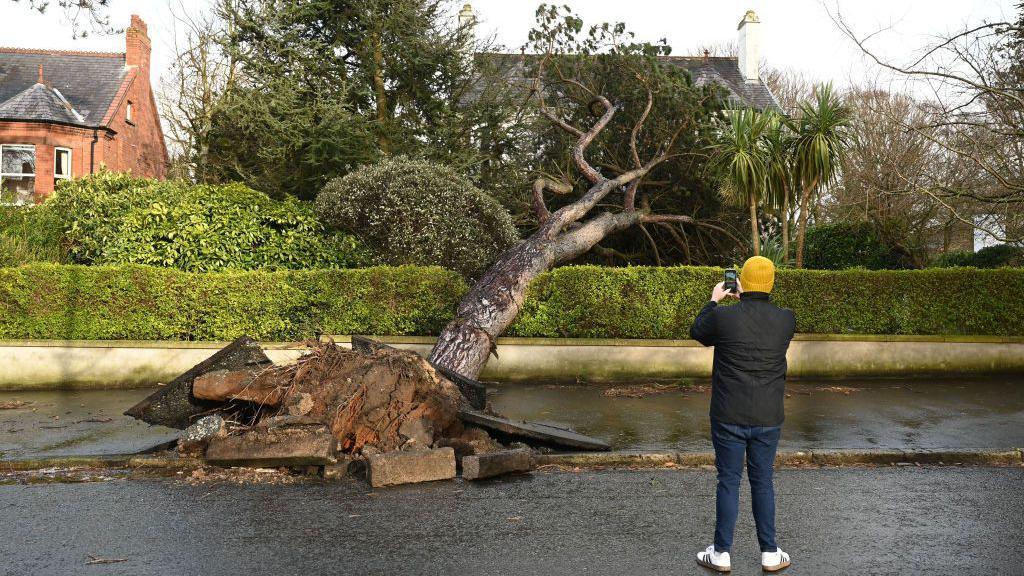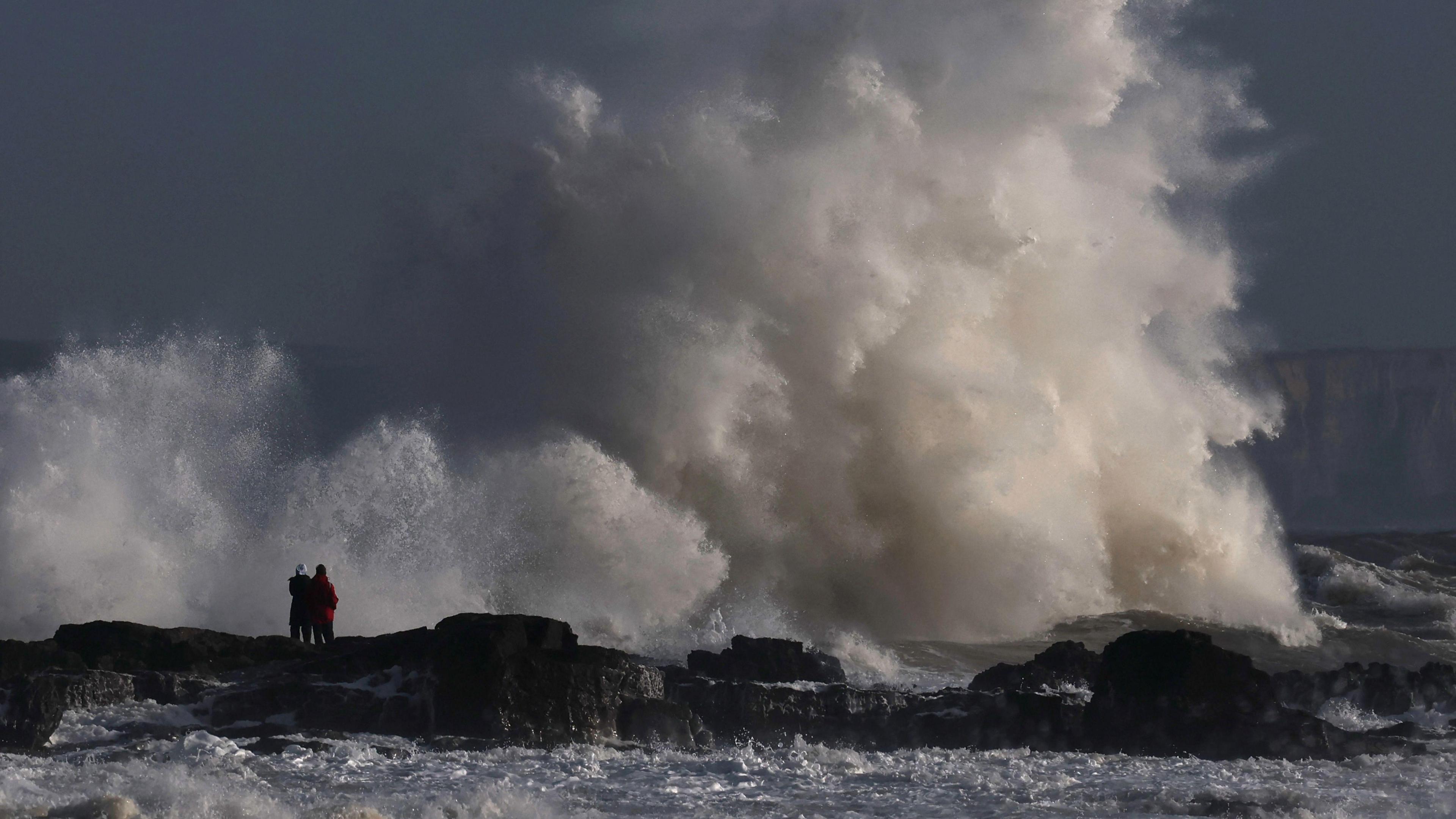Éowyn strongest storm in 10 years, says Met Office

Parts of Scotland and Northern Ireland suffered widespread property damage
- Published
Storm Éowyn was "probably the strongest storm" to hit the UK in at least 10 years, the Met Office has said, with wind gusts in excess of 100mph (160km/h).
At the storm's height, nearly a million properties were without power across the British Isles, while many road and rail links were blocked. A 20-year-old man was killed when a tree fell on his car in Ireland as winds reached a record 114mph.
Parts of Scotland and Northern Ireland suffered widespread property damage, and Network Rail Scotland logged nearly 400 damage incidents.
While the worst of the storm has passed, strong winds are expected to continue into next week.

Kacper Dudek was killed when a tree fell on his car
Although the amber and red warnings the Met Office issued ahead of Éowyn's arrival have elapsed, several lesser, yellow weather warnings for wind and rain remain in place into Sunday. A full and up-to-date list can be found here.
Parts of England and Wales could receive up to 80mm (3.15in) of rainfall over the weekend.
Met Office forecasters described Éowyn as "pretty exceptional" and the most intense storm for some areas of the UK for 20-30 years.
The man who died on Friday was named as Kacper Dudek. He was killed in County Donegal, which experienced the worst gusts. Irish police are investigating.
BBC Weather's Helen Willetts said Éowyn had moved into the North Sea by Saturday morning - but severe weather was still possible in many areas.
"The early hours saw wind gusts in Fair Isle, Scotland, to 80mph but the day ahead will see the winds gradually easing," she said.
Heavy showers, snow and squally winds will move into Northern Ireland on Saturday afternoon, and then into western England and Wales later on, she added.
Gales are also expected to develop around the coasts and over hills.
BBC's Helen Willetts has the forecast after Storm Éowyn brought record-breaking winds
'Devastating' electricity damage
Tens of thousands of properties remained without power in Northern Ireland and Scotland on Saturday, with electricity operators warning it could take several days to restore electricity to everyone.
Derek Hynes, the managing director of Northern Ireland Electricity, told the BBC the storm caused "devastating levels of damage" to the electricity network.
"We've never seen anything like that," he said.
There were more than 1,800 incidents of fallen trees, branches and other debris blocking roads, according to Northern Ireland's infrastructure department.
Paul Morrow, group commander at Northern Ireland Fire and Rescue Service, told BBC Breakfast that what his crews were witnessing was "something we've never seen before".
Northern Irish Education Minister Paul Givan said 100 schools had reported "significant damage to some buildings" and some may not be open on Monday.
Meanwhile, Police Scotland said they have responded to almost 1,900 weather-related incidents across the country.
Celtic's Scottish Premiership match against Dundee on Saturday was postponed because of damage to the team's stadium in Glasgow.
Ministers from across government held a Cobra meeting concerning the response to Éowyn, in particular "the urgent work underway to reconnect homes which have lost power", a government spokesperson said on Saturday.
They added that engineers had been sent to Scotland and Northern Ireland to aid recovery efforts.
In Ireland, 625,000 properties were without power as of Friday evening, with the nation's grid operator describing the damage to electricity infrastructure as "unprecedented, widespread and extensive".
Loss of power to treatment plants and pumping stations has also caused water supply to be interrupted in several places, Irish Water said.
Watch: Storm Éowyn brings wild weather to UK and Ireland
Ongoing travel disruption
ScotRail said work was continuing to repair its network after reporting "extensive damage". Network Rail Scotland reported around 400 incidents on its tracks, including downed trees and damaged overhead lines.
The East Coast Main Line between Edinburgh and Newcastle was among those to reopen on Saturday, but a ScotRail spokesperson said the "vast majority" of its routes remained closed while inspections and repairs continue.
National Rail said winds and rain would affect some services in northern England and parts of Scotland.
Flights have resumed after cancellations and delays, but airports have warned that Friday's disruption would have knock-on impact on services over the coming days.
Delays are being reported at London Heathrow, Edinburgh and Newcastle airports.
Edinburgh Airport said it would be operating under "challenging conditions" on Saturday, while Glasgow and Belfast International said passengers should continue to check the latest travel information with their airline before travelling.
CalMac, the main operator of ferries off Scotland's west coast, said it was still experiencing some disruption, although the majority of ferry crossings in the Irish Sea appeared to be operating normally.

Large waves smash against rocks along the Welsh coast
'Like an earthquake'
Louise McKillion, from Castlewellan in Northern Ireland, had to seek shelter in a youth hostel with her family after her home lost power.
She has been told it could take up to 10 days for it to be restored.
"Nobody can shower and nobody can have a hot meal - it's terrible," Ms McKillion told the BBC.
"You don't realise the impact that has until you're actually put into it."
Mark Jones, who lives in Coldingham in the Scottish Borders, described Éowyn hitting his area as like "an earthquake".
On Friday morning, he saw his corrugated iron carport being lifted out of the ground and tipped into an area of woodland.
"I didn't feel seriously alarmed because there was about 30ft between me and the carport and it just lifted up quite steadily and tilted over," he recalled.
"I just think the word 'storm' is too mild for what we have witnessed here. Only a hurricane could do that."
Liam Downs, an electrician from Cardross on the north side of the Firth of Clyde, said he had been driving along the coast removing trees from the road.
While going to check on a client, he saw "about 10 trees" fall within the space of 10 minutes which "completely blocked us".
"As we were driving along the coast earlier, waves were coming up onto the road and my van literally went from being in the right lane to being up on the curb," he said.
Additional reporting by George Wright, Lauren Turner and Kathryn Armstrong
Get in touch
Are you without power due to Storm Éowyn? Are you impacted in other ways? Get in touch.